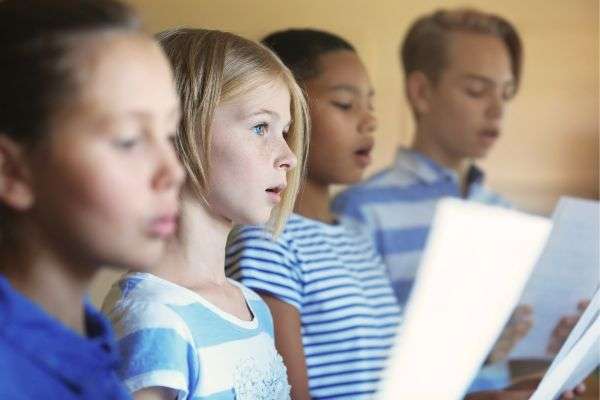Music, a universal language that resonates across cultures and generations, is a profound conduit for children’s holistic growth. Amidst the myriad avenues of musical education, singing lessons’ gentle harmonies, and transformative power emerge as beacons, illuminating the paths of young, budding voices. These childrens singing lessons shape technical prowess and serve as a gateway to self-discovery, instilling confidence and nurturing emotional expression. Join us as we venture into the captivating realm of children’s music education, exploring the pivotal role of singing lessons in shaping young voices and embracing their limitless potential.
The Benefits of Children Singing Lessons

Developing Vocal Skills
Singing lessons for children incorporate specific exercises tailored to their developmental stages. For instance, breathing exercises often involve playful activities like blowing bubbles or using feathers to teach proper breathing techniques. These engaging exercises help children understand breath control and support. Moreover, using solfege syllables (do-re-mi) assists in pitch accuracy by simplifying the understanding of pitch relationships and musical intervals. This method makes learning to sing more accessible and enjoyable for young learners.
Boosting Confidence and Self-Expression of Childrens Singing Lessons
Anecdotal evidence and studies alike showcase the transformation of shy or introverted children after participating in singing lessons. For instance, the journey of a reserved child who gradually builds confidence through singing could exemplify the transformative power of music education. Group singing or solo performances are pivotal in boosting confidence and nurturing self-expression. According to a study by the Child Psychology Journal, children who regularly take singing lessons exhibit a notable improvement in their assertiveness and expressive skills.
Emotional and Cognitive Development
Research findings have indicated a strong connection between music, emotions, and cognitive development in children, with a particular emphasis on the benefits of children’s singing lessons. The interplay of musical patterns and structures fosters emotional expression and stimulates cognitive abilities. Engaging with music can enhance problem-solving skills and spatial reasoning as children navigate the complexities of rhythm, melody, and harmony. A study published in Educational Psychology Review elaborates on how musical experiences, such as those gained through childrens singing lessons, can significantly impact a child’s spatial reasoning and mathematical abilities. This underscores the multifaceted advantages of incorporating music education into a child’s developmental journey
Approaches to Teaching Children to Sing 
Fun and Engaging in Childrens Singing Lessons
Singing lessons introduce various playful exercises, such as rhythm games or mimicry exercises, aiding in rhythm comprehension and improving vocal control. For instance, using rhythm games involving clapping or tapping can help children understand timing and rhythm in a fun and engaging way. These activities enhance learning and foster a positive association with music, making it a joyful experience for children.
Adapting teaching methods in Childrens Singing Lessons
Tailoring teaching methods for different age groups and skill levels is essential. Incorporating storytelling through music or simple repetitive melodies can facilitate understanding for younger children. On the other hand, older children might benefit from more complex vocal exercises or discussions about music theory, deepening their knowledge and engagement.
Incorporating Technology in Lessons
Technology has significantly impacted children’s singing lessons. Specific apps like “VocalizeU” or “Yousician” offer interactive vocal exercises and immediate feedback, aiding vocal training. Software such as GarageBand or Pro Tools has empowered children to record and analyze their performances, promoting self-assessment and improvement.
Challenges and Solutions in Children’s Singing Lessons

Dealing with shyness or stage fright
Addressing stage fright involves a gradual and systematic approach through exposure to small group performances or one-on-one sessions. Dr. Emily Johnson, a respected music educator, underscores the significance of creating a supportive and non-judgmental environment. Employing relaxation techniques, positive visualization, and progressive exposure can assist children in overcoming stage fright. Children can gradually build confidence by introducing performance opportunities in a safe and encouraging setting.
Maintaining interest and engagement
Introducing diverse musical genres is vital to keeping children engaged and enthusiastic about learning. Allowing students to select songs they enjoy cultivates a personal connection with the material, boosting their interest and motivation. Furthermore, encouraging creativity through songwriting or composition enhances their musical skills and fosters a sense of ownership and creativity. Implementing a songwriting program, as reported in a case study from the ABC Music School, led to a substantial increase in student engagement and enthusiasm for learning.
Handling Diverse Learning Styles
Understanding and catering to various learning styles are pivotal to effective teaching. Visual aids, such as charts, diagrams, or videos, are beneficial for visual learners, aiding their comprehension. Engaging auditory learners with singing games, listening exercises, and audio-visual content can bolster their learning. Meanwhile, kinesthetic learners benefit from movement-based activities, gestures, and rhythm games, enhancing their learning experience and understanding of musical concepts.
The Role of a Supportive Environment in Nurturing Young Voices

The Importance of Supportive Teachers and Parents
Teachers and parents are integral to a child’s musical journey, particularly in the context of childrens singing lessons. Their role in providing encouragement, support, and constructive feedback significantly influences a child’s progress in mastering vocal skills. Creating a nurturing environment with positivity and guidance fosters a child’s passion for music. The impactful relationship between supportive teachers and parents and a child’s musical development cannot be overstated, highlighting the crucial role they play in shaping the success of children’s singing lessons.
Creating a supportive community in Childrens Singing Lessons
Music, a universal language that resonates across cultures and generations, is a profound conduit for children’s holistic growth. Amidst the myriad avenues of musical education, singing lessons’ gentle harmonies, and transformative power emerge as beacons, illuminating the paths of young, budding voices. These childrens singing lessons shape technical prowess and serve as a gateway to self-discovery, instilling confidence and nurturing emotional expression.
Group singing, collaborative efforts, and performances create a supportive musical community. These experiences provide opportunities for learning from peers and cultivate essential social skills like teamwork and cooperation. Collaborative musical experiences encourage interaction and bonding among children, fostering a sense of belonging and mutual support. Join us as we venture into the captivating realm of children’s music education, exploring the pivotal role of singing lessons in shaping young voices and embracing their limitless potential. This holistic approach highlights the importance of a supportive environment, where group dynamics contribute to the overall musical and personal growth of each child.
Conclusion

In conclusion, children’s singing lessons offer far-reaching benefits beyond musical skill development. They provide avenues for boosting confidence, fostering creativity, supporting emotional and cognitive development, and creating a nurturing environment for young voices to thrive. Acknowledging the importance of adaptable teaching methods, overcoming challenges, and fostering a supportive environment are crucial in harnessing the transformative power of music education in nurturing the voices of the future generation. The continued investment in children’s singing lessons is not just about creating musicians; it’s about nurturing well-rounded individuals.









